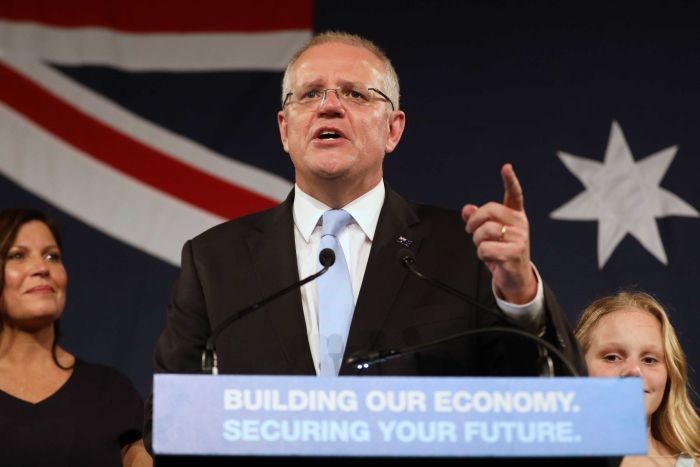In a result that very few expected, Prime Minister, the Hon Scott Morrison MP, and the Coalition were returned to government last Saturday. Despite polls prior to the election indicating a Labor victory, with the Coalition notionally behind in three seats, voters chose the incumbent government. Once results started coming in, it was clear the polls had not accurately captured the mood of the broader electorate. The Opposition Leader, the Hon Bill Shorten MP, made his concession speech at around 11.00PM on Saturday night and said he would stand aside as leader.
The AEC is still in the process of counting all the votes, but the AEC has predicted that the Coalition will have 78 seats in Parliament – currently, the Coalition has a majority of 76 seats with the electorates of Bass and Macquarie yet to be called.
So where to from here? Parliament cannot be recalled until the AEC has finished counting, declared all of the seats and the writs have been returned (which must happen by 28 June 2019). Parliament must then sit within 30 days, meaning that if the writs are not returned earlier than 28 June, our politicians will be back on in Canberra for a sitting week before the end of July.
Despite results still being finalised, the Prime Minister is also expected to announce his new Cabinet by Sunday, with the new ministry to be sworn in at Government House in Canberra early next week.
Meanwhile, Labor is finalising the process for selecting its new Leader and Deputy Leader. If no other candidate nominates for the leadership, the Hon Anthony Albanese MP will be appointed to the leadership, with ongoing speculation as to who might take the spot of deputy.
THE UNCERTAINTY OF OPINION POLLING
For both major parties, opinion polling has long been the indicator of choice for public sentiment. It has been as the justification to depose prime ministers and leaders from both sides, and it has been as the justification to change the policy agendas of both major parties.
However, with the recent federal election result, and state election results, showing there to be a level of inaccuracy in opinion polling, should we all be more skeptical of opinion polling as an accurate indicator of public sentiment and what does this mean for political engagement going forward?
To answer this, looking at three previous state and federal elections is a good place to start.
At the 2018 Victorian State Election, it is fair to say that the prediction of the outcome in the polls was wrong. The Victorian Labor Government received a swing towards it from anywhere between two to four per sent larger than was predicted.
At the 2019 New South Wales State Election, we saw a similar outcome. The NSW Coalition Government experienced a less aggressive swing against it than what was predicted in the polls, and retained majority government. Right up to polling day, it was predicted that the result would be very close, including that an upset victory to NSW Labor might be on the cards.
And most recently, the polls predicting the outcome of the 2019 Federal Election were also wrong. Labor had been ahead in the two party preferred polls at all times since the 2016 election. Yet on election night, the Coalition was re-elected with an increased majority.
All the major polling companies, including Newspoll, Ipsos and YouGov Galaxy, were predicting a Labor victory, even until the day before the election. YouGov Galaxy even had exit polls on election day that were predicting a Labor victory. However, as the Prime Minister put it, the ‘quiet Australians’, the people unlikely to answer these opinion polls, re-elected the Coalition.
These examples show that polling has, for three consecutive elections, underestimated the vote of the incumbent government. So, is polling broken, or do methods need to change?
This week, we have seen pollsters and customers alike question why there was a consistent difference in the polling compared to the outcome. Nine’s newspapers have indicated overnight that they would put a pause on polling for the moment, while Nine undertakes a review. Others have suggested a broad review of polling and methods should be conducted in order to restore some faith in the results going forward.
So, what does this mean for businesses wanting to undertake political engagement going forward?
The reality is that engagement should be undertaken outside of polling results. It is no secret that Labor saw a surge in engagement with it in recent months, when the polls were indicating a win to Labor. But those businesses that continued to work with the government of the day and the potential government of tomorrow have future-proofed their interests. And in an environment where we continue to see tight numbers in the House and the Senate, the crossbench is becoming increasingly important and necessary for business to include in any engagement (policy) strategy.
Whilst opinion polling companies are likely to amend their methodologies and will argue their opinion polling is now right, it is critical to protect your business’ interests by taking a multi-partisan approach to politics.
This is certainly the approach we recommend at Nexus Public Affairs, and if you would like any assistance with multi-partisan political engagement, don’t hesitate to get in touch with a member of our team.
Latest posts by Nexus APAC (see all)
- United Kingdom General Election 2024: An Overview - April 15, 2024
- Australian Voters Go to the Polls - February 26, 2024
- Secretaries of Federal Departments – An Overview - February 1, 2024



